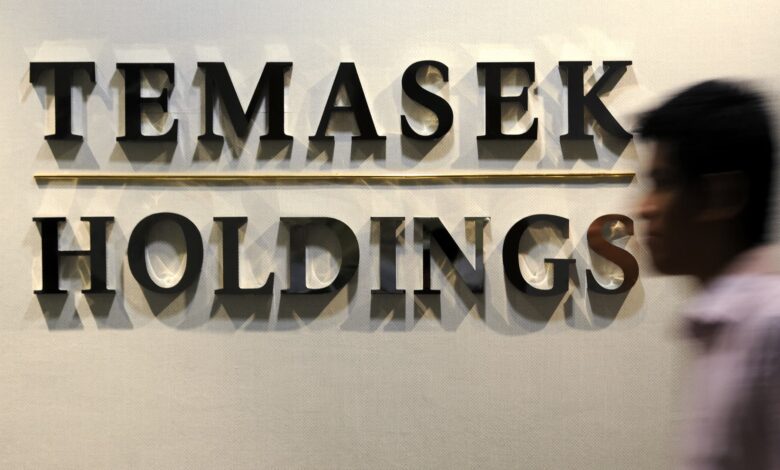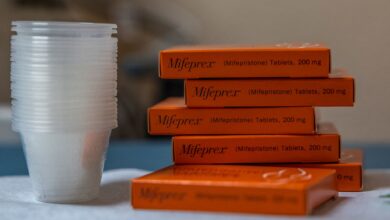Singapore state investor Temasek focuses on early AI adopters in the US; cautious on China

Temasek Holdings sign at their office in Singapore.
Munshi Ahmed | Bloomberg | Getty Images
Singapore’s Temasek said Tuesday that the bulk of its investments will continue to go to the United States, focusing on early adopters of AI in traditional industries in the country.
Rohit Sipahimalani, chief investment officer at Temasek, told CNBC that while the U.S. market overall looks expensive, the equally weighted S&P index is at just 16 times earnings, which is below its long-term average.
Temasek, which does not provide a precise breakdown of its exposure to US assets, said the Americas region accounts for 22% of its portfolio.
The company, whose portfolio value rose nearly 2% to S$389 billion ($288 billion) in the financial year ended March, added that it was cautious on the China market.
The report pointed out that while the Chinese government’s pro-growth stance will support the recovery, the economy still has structural challenges and if domestic demand fails to pick up, China’s economy and inflation rate will continue to face downward pressure.
Temasek Deputy CEO Chia Song Hwee said the challenges facing China lie largely on the demand side of the economy.
Companies that “drive domestic consumption or meet domestic consumption needs” such as in the biotech, robotics sectors and those in the electrification and electric vehicle value chain will be of particular interest, Chia said.
He added that while some of these businesses have export potential, given the geopolitical risks, the company is really looking for companies that can rely entirely on the domestic market and are less dependent on exporting to other countries.
Overall, Temasek will maintain a cautious approach and will continue to monitor government policies in the world’s second-largest economy, the state-owned investor said. Chinese assets account for 19% of Temasek’s portfolio, down from 22% in fiscal 2023.

The company is also looking to invest in Japan, which has seen growing interest from foreign investors as the country’s market surged to a record high this year.
Alpin Mehta, deputy head of private equity at Temasek, explained that the Japanese corporate landscape continues to benefit from structural and cyclical momentum driven by corporate governance reforms.
“Over the past few years, we have seen an increase in private equity investment activities in Japan and these are some of the funds that we invest in. So our idea is to invest with them, to do joint investments with them.”
Mehta said Temasek has seen its exposure to Japan increase to 1%, from “almost nothing in the last few years,” adding that it is still “in the early stages.” He pointed out that some companies in Temasek’s portfolio have exposure to Japan, such as Vertex Capital, as well as real estate companies Capitaland and Mapletree.
The company sees opportunities in India due to its large domestic market and supply chain diversity, as well as in Europe where it sees opportunities in the green energy transition.
In FY2024, Temasek invested S$26 billion in areas such as technology, financial services and healthcare.
Outside of Singapore, the bulk of Temasek’s investments are directed to the United States, followed by India and Europe.
Portfolio performance
After pricing unlisted assets to the market, Temasek’s net portfolio value at market price reached S$420 billion, up from S$411 billion a year earlier.
Temasek said it decided to disclose the figures because unlisted assets make up the majority of its portfolio at 52%, up from 20% in 2004. “With this increase, reporting our unlisted assets at market value is more in line with our peers.”
“Over the last decade, we’ve found that we have a lot more of an advantage on the private side, just because it’s a function of our better access, the way we can work with these companies, etc.,” Sipahimalani said.
He explained that the firm does not have a target ratio for unlisted and listed assets in its portfolio, but will invest when it finds the right opportunity.
“We need to have a balance between liquidity and private assets. So they will always balance there, but we don’t have a specific target. I think we are quite comfortable,” he added.
While the one-year total shareholder return is up just 1.6%, higher than the 5% decline in 2023, Temasek’s 10-year total shareholder return remains steady at 6%, while the 20-year index has slipped slightly from 9% to 7%.
This is because it excludes fiscal 2004, which saw a one-year TSR of 46% following the SARS pandemic.
The company alone divested S$33 billion in the financial year, resulting in a net divestment of S$7 billion, compared with a net investment of S$4 billion the previous year.




